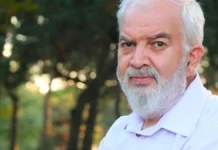Victims of a massive government purge that took place in Turkey in the aftermath of a failed coup in July 2016 held a demonstration on Thursday in front of the İstanbul office of the United Nations, asking the UN not to remain silent about the injustices to which they’ve been subjected, Turkish Minute reported.
Under the pretext of an anti-coup fight, over 130,000 public servants, including 4,156 judges and prosecutors as well as 20,610 members of the armed forces were summarily removed from their jobs by controversial emergency decree-laws known as KHKs.
Pro-Kurdish Peoples’ Democratic Party (HDP) deputies Ömer Faruk Gergerlioğlu, Hüda Kaya and Musa Piroğlu; independent deputy Cihangir İslam; and Green Left Party spokesperson Sinan Tutal joined the purge victims in İstanbul’s Şişli district.
The purge victims carried banners that read “We want our rights, taken away from us through KHKs, back,” “Stop death KHKs” and “KHKs will go away, we will stay” and chanted slogans against the KHKs.
Gergerlioğlu, who delivered a statement during the demonstration, said the KHKs had affected the lives of at least 1.5 million people in Turkey, likening the government decrees to the practices of the national socialists during the Nazi era in Germany.
“We are faced with a government that has branded everyone a terrorist,” said Gergerlioğlu, who himself is also a purge victim as he was removed from his job as a medical doctor at a state-run university in northwestern Turkey through a post-coup government decree.
The purged civil servants are accused of ties to terrorist organizations or to groups considered by the National Security Council (MGK) to be involved in activities against national security. They were not only fired from their jobs but also banned from working again in the public sector and getting a passport. The government also made it difficult for them to work formally in the private sector. Notes were put on the social security database about dismissed public servants to deter potential employers.
Dismissed civil servants face other kinds of discrimination as well. In a striking case, an insurance company refused to pay for the damages caused by a car accident to the wife of a fired public servant who was incarcerated at the time. According to the company, the government had instructed them in a directive not to make payments to civil servants who had been terminated from their jobs.
In another well-known case, Garanti BBVA, an affiliate of Spanish Bank BBVA, refused to open a bank account for a dismissed public servant. The bank had to reverse its position after the pro-opposition media covered the incident extensively and agreed to open a restricted checking account. The account holder could only use his account for withdrawing his salary. Other banking transactions such as money transfers were still prohibited.















